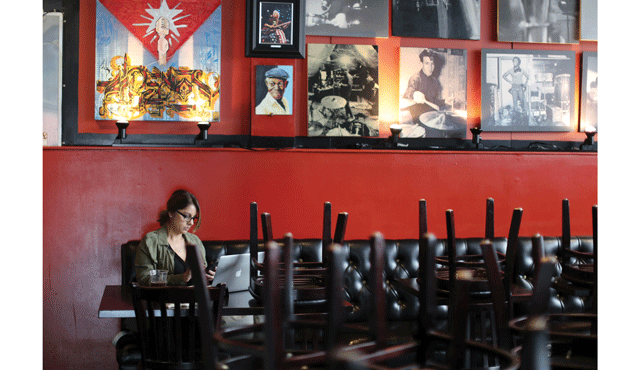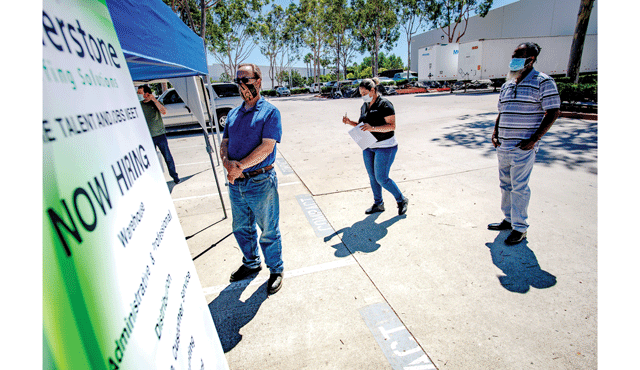Humans are creatures of ritual and routine. As a result, for many of us, jobs and work are important anchors. This is especially true in the seas of a storm-tossed economy.
Jobs give us means to house, feed and clothe our families. For some they are sources of pride and self-worth. And for many of us, jobs keep anxiety at the door, its rhythms and routines taken for granted as the metronome of our daily lives.
“Work is a big part of our lives,” said Greg Walgenbach, director of Life, Justice and Peace for the Diocese of Orange. “It’s a predictable part.”
Or at least it used to be.
Since the onset of the COVID-19 pandemic, even those who have kept jobs, even so-called essential workers, have been caught in the economic squall.
Many are enduring furloughs. Food service workers may have been laid off, brought back and laid off again. Working from home has not only changed routines, but forced workers to quickly learn new skills or take on new job functions.
Their worlds are influx as they are buffeted by a wide array of stressors.
“U.S. employees’ risk of depressive disorder, post-traumatic stress and general anxiety disorder each increased by at least 40 percent since February,” according to a monthly index in June on the mental health of U.S. workers cited in Occupational Health and Safety Magazine.
The magazine adds, “While the reopening of some businesses seemed to help some people emotionally/mentally, the worsening rate of the infection and cases across the country means people will likely be under emotional strain for the long haul.”
Walgenbach predicts workers may only now be entering the front edge of a tempest of job loss, job abuse and evictions.
The Diocese of Orange has not been immune to the financial crunch, as scores of workers have been laid off or furloughed.
At the Pastoral Centers, Walgenbach said, about 33 percent of employees have been laid off or faced furloughs.
“I think some areas are higher,” he said.
Pope Francis in March urged business leaders globally to seek solutions that will not hurt employees and their families.
“Every man for himself, is not a solution,” the pope said in an interview via Skype that aired in Spain. “A business that lays off employees to save itself is not a solution. In this moment, instead of laying off, we must welcome and make everyone feel that there is a society of solidarity.”
Walgenbach said that even those with secure, steady work are not free of anxiety and stress, including “essential workers,” such as health care workers, those interacting with possibly infected people in the public, and workers in cramped conditions.
“Yes, they can work, but it’s much more hazardous,” he said. “They’re taking on not only anxiety, but the risk of real harm. In that sense, all bets are off in the predictability of work.”
For those who lose jobs, strains on mental health can mount even more quickly.
“Losing one’s job is stressful for many reasons, not only due to loss of financial resources for living (rent, utilities, food) but also because it can lead one to feel loss of meaning, purpose or worth,” Linda Ji, director of Pastoral Care (For Families in All Stages), wrote in a reflection of the importance of work. “So the loss of a job can lead one to feel disconnected from a major way one was participating in that creative, holy work to which one is called.”
While sheltering at home and social distancing may be mandated, Catholic leaders stress that those are not the same as isolation and parishioners need to stay connected.
“Relationships can suffer, both within the family and with friends and the larger community, as people withdraw emotionally or become disconnected due to lack of resources or ties that bound them before,” according to Ji.
As a result, despite staffing shortages, Walgenbach said it is vital that the Church “be more proactive in connecting with people in their homes.”
Walgenbach said the Church must rethink the focus of ministry, including issues like eviction and job loss and using ministries to help parishioners find work.
Ji wrote, “The Church can help by providing for practical needs (food, shelter or rent assistance) and by keeping each other connected in community with social and emotional support and prayers.”
Pope Francis said the pandemic has shown “how vulnerable and interconnected” people are and urged greater care for those most affected.
“The Church can also point families to learning healthy coping skills and ways to keep marital and family relationships strong,” Ji wrote. “And, of course, the Church reassures the faithful of the inherent dignity and worth of all humans as creatures made in the image of God through her preaching and teaching.”
As bad as times are now and may continue to be, Walgenbach says the faithful need to know they have not been abandoned by the Church or God.
“We need to know God is not distant, that he’s present in the people,” Walgenbach said. “Trust God.”


